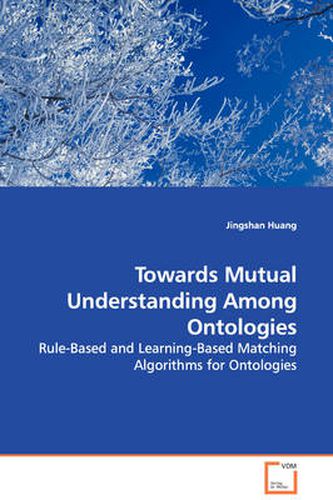Readings Newsletter
Become a Readings Member to make your shopping experience even easier.
Sign in or sign up for free!
You’re not far away from qualifying for FREE standard shipping within Australia
You’ve qualified for FREE standard shipping within Australia
The cart is loading…






This title is printed to order. This book may have been self-published. If so, we cannot guarantee the quality of the content. In the main most books will have gone through the editing process however some may not. We therefore suggest that you be aware of this before ordering this book. If in doubt check either the author or publisher’s details as we are unable to accept any returns unless they are faulty. Please contact us if you have any questions.
Ontologies are formal, declarative knowledge representation models, forming a semantic foundation for many domains. As the Semantic Web gains attention as the next generation of the Web, ontologies’ importance increases accordingly. Different ontologies are heterogeneous, which can lead to misunderstandings, so there is a need for them to be related. The suggested approaches can be categorized as either rule-based or learning-based. The former works on ontology schemas, and the latter considers both schemas and instances. This book makes 6 assumptions to bound the matching problem, then presents 3 systems towards the mutual reconciliation of concepts from different ontologies: (1) the Puzzle system belongs to the rule-based approach; (2) the SOCCER (Similar Ontology Concept ClustERing) system is mostly a learning-based solution, integrated with some rule-based techniques; and (3) the Compatibility Vector system, although not an ontology-matching algorithm by itself, instead is a means of measuring and maintaining ontology compatibility, which helps in the mutual understanding of ontologies and determines the compatibility of services (or agents) associated with these ontologies.
$9.00 standard shipping within Australia
FREE standard shipping within Australia for orders over $100.00
Express & International shipping calculated at checkout
This title is printed to order. This book may have been self-published. If so, we cannot guarantee the quality of the content. In the main most books will have gone through the editing process however some may not. We therefore suggest that you be aware of this before ordering this book. If in doubt check either the author or publisher’s details as we are unable to accept any returns unless they are faulty. Please contact us if you have any questions.
Ontologies are formal, declarative knowledge representation models, forming a semantic foundation for many domains. As the Semantic Web gains attention as the next generation of the Web, ontologies’ importance increases accordingly. Different ontologies are heterogeneous, which can lead to misunderstandings, so there is a need for them to be related. The suggested approaches can be categorized as either rule-based or learning-based. The former works on ontology schemas, and the latter considers both schemas and instances. This book makes 6 assumptions to bound the matching problem, then presents 3 systems towards the mutual reconciliation of concepts from different ontologies: (1) the Puzzle system belongs to the rule-based approach; (2) the SOCCER (Similar Ontology Concept ClustERing) system is mostly a learning-based solution, integrated with some rule-based techniques; and (3) the Compatibility Vector system, although not an ontology-matching algorithm by itself, instead is a means of measuring and maintaining ontology compatibility, which helps in the mutual understanding of ontologies and determines the compatibility of services (or agents) associated with these ontologies.